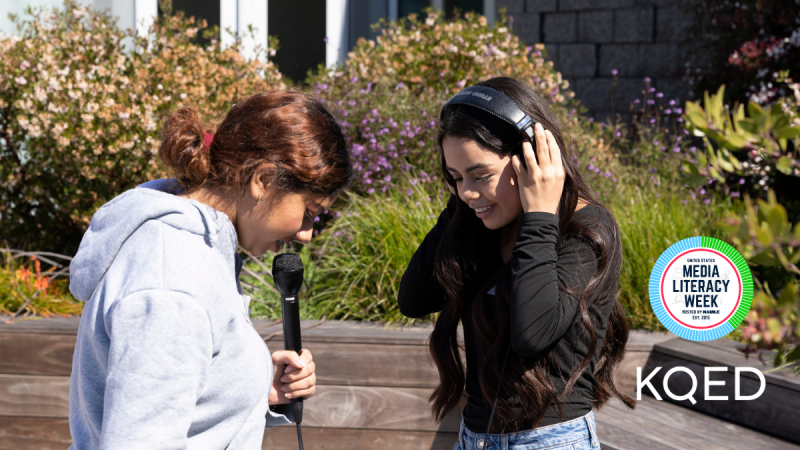Media Literacy Week is almost here! KQED Education is excited to participate in NAMLE’s annual celebration of the skills required to navigate the media landscape. Fully media literate students go beyond consumption and analysis to become active creators. Making media in the classroom empowers students to share their own narratives and perspectives through media, as well as better understand the media they consume on a daily basis. This Media Literacy Week, KQED is focusing on creation. Below, find multiple ways educators can engage in media making to bring the full range of media literacy learning in their classrooms.
You can find all of our professional development and classroom curriculum resources year-round on our website.
Join Us Live
Media creation is a vital part of media literacy. At KQED, our core mission is to elevate diverse youth voices, and what better way to do that during Media Literacy Week than with two media-making workshops that center student voice?
Audio Storytelling: Intro to Soundscapes
Wednesday, Oct 25, 4-5pm (K-12)
Explore audio storytelling and its immersive potential through sound. This workshop will emphasize soundscapes and the use of sound effects to engage listeners. Participants will create sound-rich audio stories and access classroom-ready resources, making it suitable for both beginners and those with prior experience in audio production.
Next Level Audio Storytelling: Engaging Student Voice
Thursday, Oct. 26, 4-5:30pm (K-12)
Empower your students to share their voices through podcasts, a powerful tool for building traditional and media literacy skills. Whether you want to integrate podcasting into an existing unit or explore KQED’s Show What You Know Youth Media Challenge, this workshop offers hands-on experience in scripting and audio production. No prior experience is necessary, making it suitable for educators at all levels.
Our Media Literacy Week audio workshops are thematically connected, but can also stand alone. Join us for one or both!
Get Recognized for Your Skills
Already a media literacy teacher leader or looking to become one? The PBS Media Literacy Educator Certification by KQED is designed to give educators the knowledge, resources, and skills necessary to become effective media literacy instructors. It also offers insights into best practices and pedagogical approaches for teaching media literacy. With access to up-to-date resources, including lesson plans, multimedia materials, and information on current media trends, educators can stay current in their field. Certification can also help educators with career development by getting recognized for their commitment to centering media literacy in their classrooms.
Your Award Awaits: How to Become a PBS Certified Media Literacy Educator
Wednesday, October 18, 4-5pm PDT
Learn how to become a PBS Certified Media Literacy Educator as part of your existing teaching practice. No expensive training or fees required!
5 Steps to Move Students from Consumers to Creators
Want to grow your media literacy expertise, but short on time? Below are 5 small steps (one for each day of Media Literacy Week!) you can follow to develop your own media literacy skills and start your students on their journey of media creation.
-
- Browse Student-Made Media Projects
Looking for inspiration for the types of media your students can make? Look no further than the Youth Media Showcase, which is a collection of all the student-made media submitted to the Youth Media Challenge. Use the filters to search for student work by project, media type, or even topic. STEM teachers, jump straight to this playlist of STEM-focused media projects. - Sample a FREE Teach Course
We’ve got an entire free online PD course on Analyzing Media Messages: Bias, Motivation, and Production Choices. Get a taste for the class by checking out the lesson on “Analyzing Media to Make Media”. Sign up here in minutes! - Attend a Workshop (or Two!) on Making Audio
Learn how to make sound-rich audio stories at our workshop on Wednesday, October 25. Come back on Thursday, October 26 to find out how you can integrate audio storytelling into your existing classroom curriculum to engage your students’ voices. - Spark a Classroom Discussion on Media
Gear up for a week of media literacy with a classroom discussion on consuming media. Encourage students to think critically about why media is presented the way it is and the effect this can have on people’s behaviors. Watch the Above the Noise episode on Mind Control: How Apps Use Design Tricks to Hook You, which was co-produced by Common Sense Media. The classroom questions in the accompanying educator guide will help students reflect on their own consumption before analyzing the components of the apps that keep us there. (Find more videos like this and lessons developed by Common Sense Education and Harvard’s Center for Digital Thriving in the Digital Well-Being collection. ) - Pick a Youth Media Challenge project
Ready to start your students on their journey to becoming media-savvy creators? Browse the three Youth Media Challenge projects on our website. With nine different media types to choose from, it’s never been easier to find the right media project for your classroom. Each project works with multiple subject areas, from ELA to STEM to Economics, and comes with a range of curricular supports in both English and Spanish.
- Browse Student-Made Media Projects
